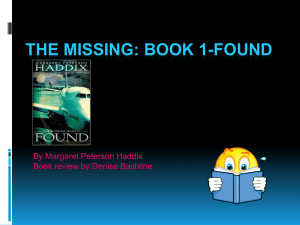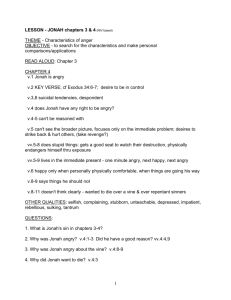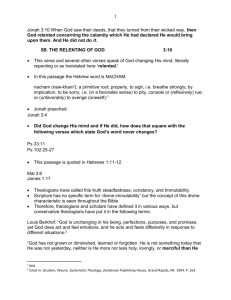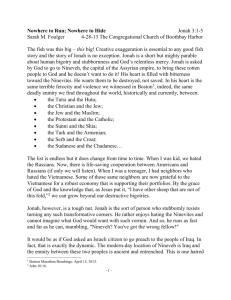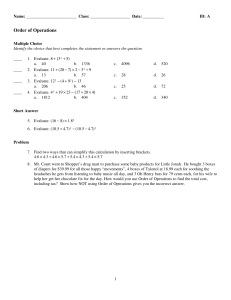Watercolors - Shaping the Story
advertisement
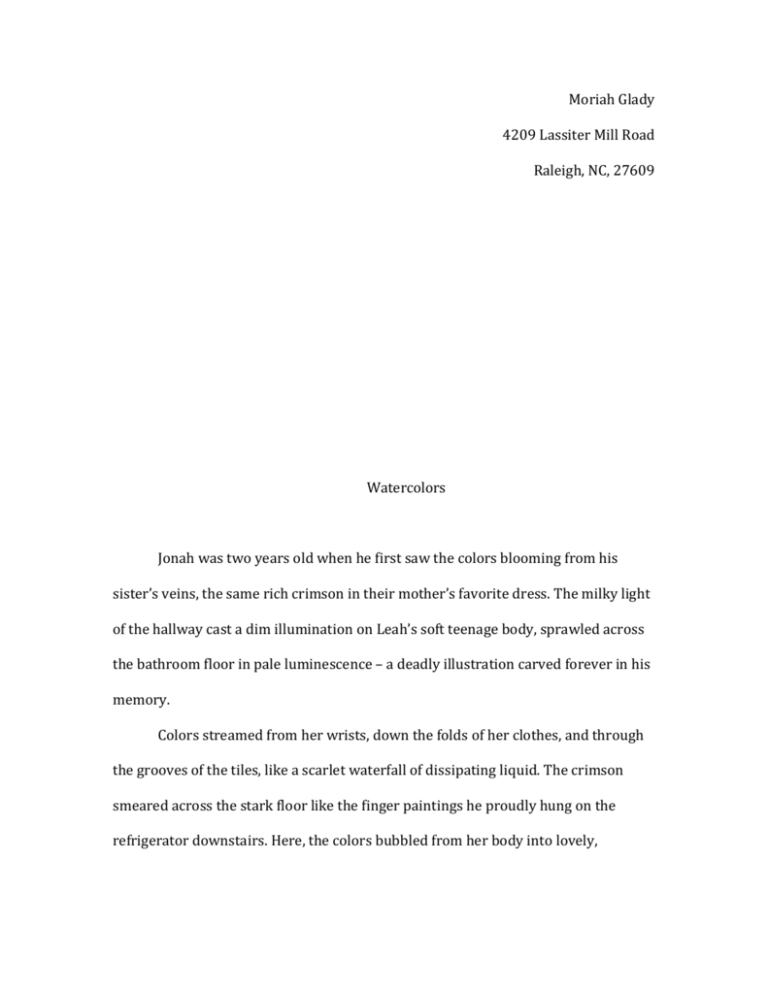
Moriah Glady 4209 Lassiter Mill Road Raleigh, NC, 27609 Watercolors Jonah was two years old when he first saw the colors blooming from his sister’s veins, the same rich crimson in their mother’s favorite dress. The milky light of the hallway cast a dim illumination on Leah’s soft teenage body, sprawled across the bathroom floor in pale luminescence – a deadly illustration carved forever in his memory. Colors streamed from her wrists, down the folds of her clothes, and through the grooves of the tiles, like a scarlet waterfall of dissipating liquid. The crimson smeared across the stark floor like the finger paintings he proudly hung on the refrigerator downstairs. Here, the colors bubbled from her body into lovely, haphazard shapes across the bathroom, large streaks and loose circles rapidly fading as they expanded. He dipped his baby hand into a patch of color, neatly undisturbed near the nape of her neck. The colors felt warm between his fingers, round and soft, red sticking to every crease in his palm. He looked around the bathroom with wide brown eyes, soaking in the scene with a blind innocence to haunt his adulthood. With artistic resolution, Jonah pressed his hand against the cheap chestnut of the sink cupboards, leaving a tender imprint of tiny fingers, with delicate drops of red dripping from the shape of his palm like blood bitten icicles melting into scarlet puddles. A metallic scent stung his senses, and heavy waves of sickness churned his stomach over like sloshing, restless waters. The air inside his house was thick and still, the evening summer air quietly coming through the open windows, every dusty surface soaked in the moonlight. Humidity flooded the house and clung to the metallic scent, hanging heavily in the bathroom and wafting into the hallway. Acid and iron lingered for weeks. No lights were on throughout the house; no footsteps followed his blind wandering into the explosion of crimson. For three hours, a baby with curiosity greater than his own understanding crawled in the blood from his dead sister’s veins with the flippancy of a child painting with watercolors. Shaking arms scooped up his little body, splattered and smeared in dark red. He looked down on Leah with increasing and inexplicable anxiety through the screams of his mother and the pants of his father, heightening at the sight of their brown-eyed baby as a canvas for Leah’s blood. His father shook her body that hung limp without agency, so blatantly lifeless, his heart filled with anger – an immoveable anger, colored by resentment for her selfish death, and conflicted by guilt for feeling resentful. Jonah’s mother clung to her living child from the threshold of the bathroom, consumed by her shock and fearful of its reality. She clung to her baby with a relentless grip, until she felt the residue of his red-spattered skin rub off on her fingers. She screamed at the pitch of a woman in labor and let the child loose like a rabid animal, filled with disgust she would never shake off. At two years old, Jonah was stripped of his innocence before he could form memories. A thirst for destruction followed him in every thought he made, every action he took. His lust for sick pleasures haunted him without explanation. Why would you ever tell a child this story, releasing the inevitable nightmares on the rest of his future? For the majority of Jonah’s childhood, his mother could not look at him without remembering the macabre paint strokes that covered his skin, the way the second bathroom would never feel clean, no matter how many times she doused the floor in pungent bleach. One Tuesday morning seven months later, Jonah ate a bagel and watched cartoons on the tiny television in their living room, while his mother inspected the house for the source of a recent beetle infestation. She followed the sporadic trickle of little black bugs down their musty hallway to the door of the bathroom she detested with a magnitude so great her hands trembled. In the darkest corner behind the toilet, a dime-sized hole broke through the paneling and let the beetles in like a slow and determined army from the outside world. She crouched over the tiles to discover a lone soldier and noticed a dark brown color, reminiscent of red, splattered on a tile in the perpetual shadows of fluorescent light. One persistent stain had escaped the bleach cleansing of seven months ago and unleashed its destruction, sending a mother a heaving over the toilet with latent feelings of recent loss consuming her system and exploding in her stomach. I’m not staying in this house, I can’t live in this place, Jonah heard the muffled screams of his parents through the wall between the living room and the master bedroom. Leah destroyed the value of the house, Daddy lost his job, moving was simply not feasible. Jonah didn’t understand, but absorbed the anger like an emotionless sponge, void of the blissful ignorance childhood might have granted him, and filled with an enigmatic expectation for misery. Daddy said it was Mommy’s fault, she knew Leah the best, she would’ve seen it coming. The screams escalated and voices shook; loud thumps reverberated from the dividing wall and a sudden shout separated from the rest. The next time Jonah saw familiar colors, it was underneath his mother’s skin, a dark blend of reds and blues and purples painted across the left side of her face, the residual colors of a sickening sunset. She exited the bedroom with puffy eyes and glared at her child with lingering resentment. “Mommy, look,” Jonah crawled to his feet and toddled with chubby legs to a stack of papers haphazardly covered in violent streaks of red crayon. “Leah,” he pronounced to the best of his ability, and toddled back towards his mother. In a glance, his mother felt the breath sucked out of her lungs and she hoarsely spat, “Get that shit out of my face.” Jonah experienced his first feeling of rejection and plopped to the floor with the drawing in hand, calling out, “Mommy,” as she turned her back and went outside to sort out her feelings with a pack of cigarettes. Each year the drawings became more real and more vivid, though the scene of her death elapsed in his memory. His latent desire for destruction, thirst for morbidity, and resistance to feeling projected on the paper with paintings his teachers considered “alarming” and “sick.” A certain collage of darkness poured out from his subconscious, sweeping every page with horrified faces and gruesome scenes, the motif of demise almost always present. But as he grew old enough to understand his sister’s death, his father told him the house was empty, and his tortured subconscious was the only remnant of a fateful day. After Jonah found his sister in the bathroom, his parents locked him inside the bedroom and he heard the stampede of footsteps as men stomped about the little house and took her limp body to the morgue. A few days later, Jonah pattered down the hallway and called out her name with growing agitation when she never answered. His mother found him crying in the kitchen because Leah promised to paint with him before she fell asleep on the bathroom floor.

